Key takeaways:
- Off-grid living promotes self-sufficiency by relying on renewable resources for energy, water, and food, fostering a deep sense of freedom and connection to nature.
- Financial savings from reduced utility bills and increased resilience are significant benefits, with experiences of adapting to challenges enhancing personal growth.
- Challenges include resource unpredictability and isolation, emphasizing the importance of community and adaptability in off-grid life.
- Successful off-grid living requires flexibility, resourcefulness, and building a supportive network with fellow off-grid dwellers.
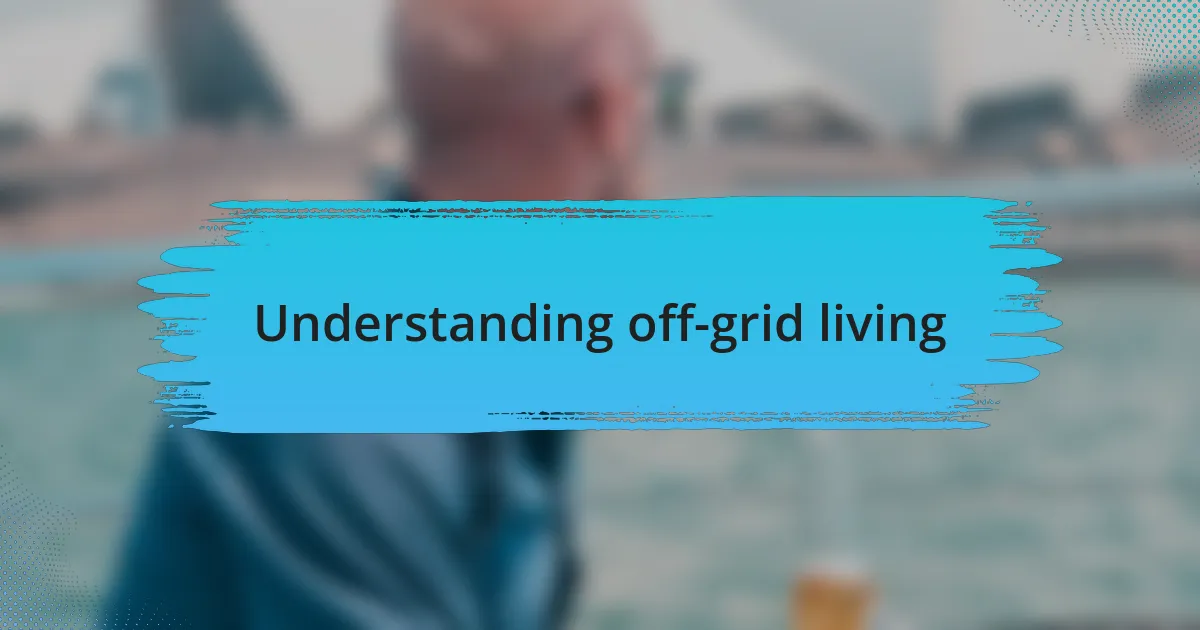
Understanding off-grid living
Off-grid living is a lifestyle choice that revolves around self-sufficiency, typically characterized by using renewable resources for energy, water, and food. I remember the first time I turned off my electricity for a few days; it was both terrifying and liberating. Have you ever felt the sting of dependency on modern conveniences? That initial fear soon gave way to a profound sense of freedom as I learned to rely on the beauty and resources around me.
Learning about off-grid systems can feel overwhelming at first, especially when you dive into the nuts and bolts of solar panels and water filtration methods. As I navigated this terrain, I found myself eagerly researching methods to harness nature’s bounty. Each small victory—like setting up my first solar panel—was a reminder of my capacity to adapt and thrive. Isn’t it fascinating how necessity pushes us toward innovation?
Communicating with others in the off-grid community opened my eyes to the shared experiences and insights that can transform solitude into solidarity. I’ve shared meals with neighbors who have become like family, swapping tips on gardening and rainwater collection. How do we define community in a more isolated setting? I discovered that true connection thrives even in the most remote places, making off-grid living not just a way to exist, but a way to enrich our lives through shared wisdom and opportunity.
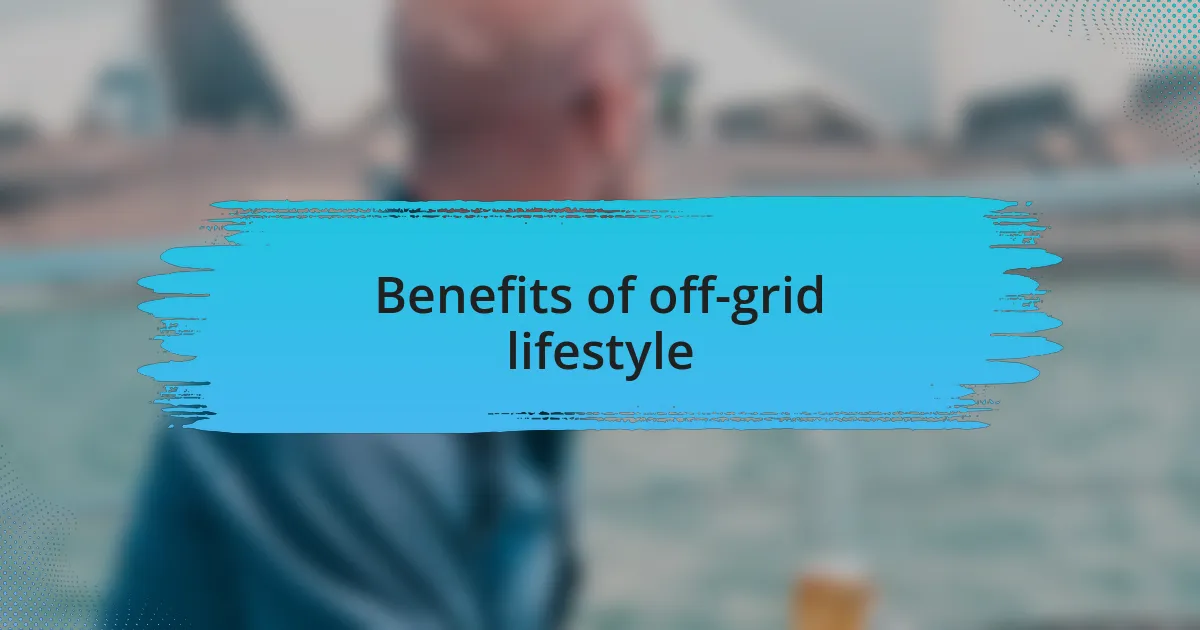
Benefits of off-grid lifestyle
Living off-grid offers a profound sense of freedom that’s hard to describe. There’s something so rewarding about being less reliant on external systems. When I first harvested rainwater, I felt an exhilarating connection to the environment—a reminder that I could source my needs directly from nature. Isn’t it remarkable how something as simple as water can feel like a victory?
Another benefit worth mentioning is the significant financial savings that come with this lifestyle. I was surprised to see how quickly my monthly expenses dwindled once I embraced solar energy. Eliminating those utility bills not only eased my stress but also gave me more space in my budget for what truly matters—like a spontaneous weekend trip on a yacht. Hasn’t anyone ever felt that thrill of enjoying life without the shadow of debt looming over them?
Additionally, off-grid living fosters self-reliance and resilience, qualities I cherish now more than ever. I remember facing a particularly harsh winter; it forced me to rethink my food storage methods and cultivate my garden strategies. The experience taught me invaluable lessons about adaptability and patience, sparking a sense of pride in overcoming the challenges that come with remote living. How often do we really test our limits and find strength in the struggle?
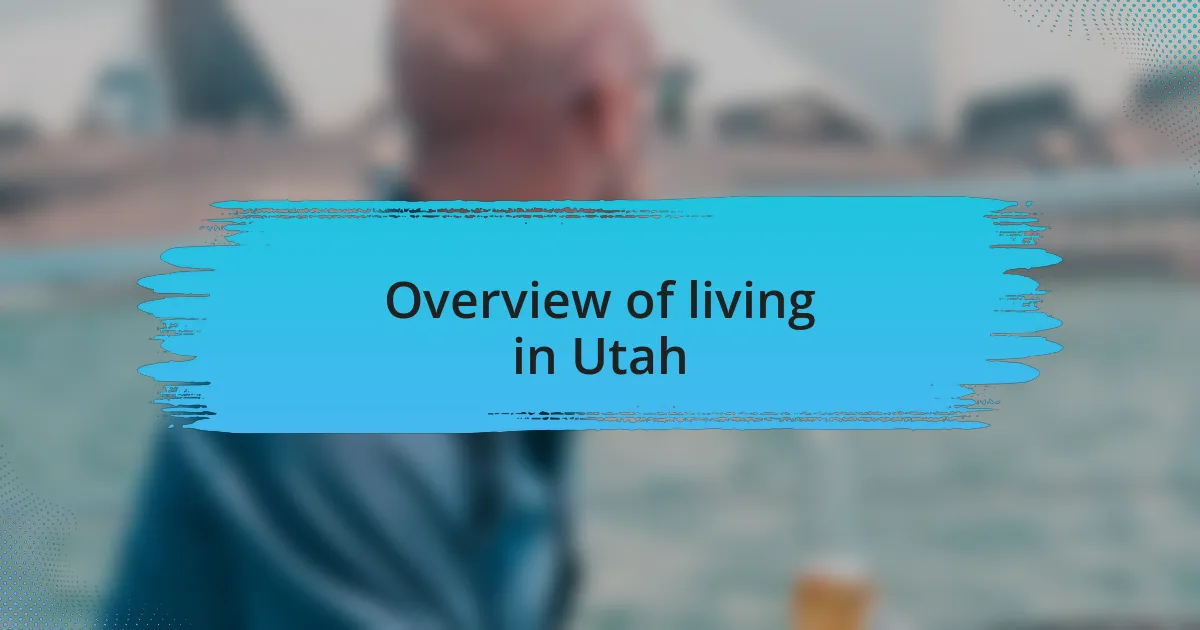
Overview of living in Utah
Living in Utah presents a unique blend of stunning natural beauty and a close-knit community vibe. I still vividly recall my first hike in the Wasatch Range, the air crisp and invigorating, making every step feel like a new beginning. Isn’t it fascinating how a landscape can reshape your mindset and priorities?
One of the things I’ve come to appreciate about Utah is its diverse climate. From the arid deserts to the snowy mountains, each season offers a delightful contrast. I remember the first time I experienced the magical transition from summer to autumn foliage; it felt as though nature was putting on a personal show just for me. Has there ever been a moment when the world around you simply took your breath away?
Utah is also overflowing with opportunities for outdoor activities. Whether it’s skiing in Park City or mountain biking in Moab, I often find myself choosing adventure over routine. Have you ever felt that thrill of exploring an uncharted trail, where every corner holds a new surprise? That spirit of exploration is ingrained in the lifestyle of those who call Utah home, creating a rich tapestry of experiences waiting to be lived.
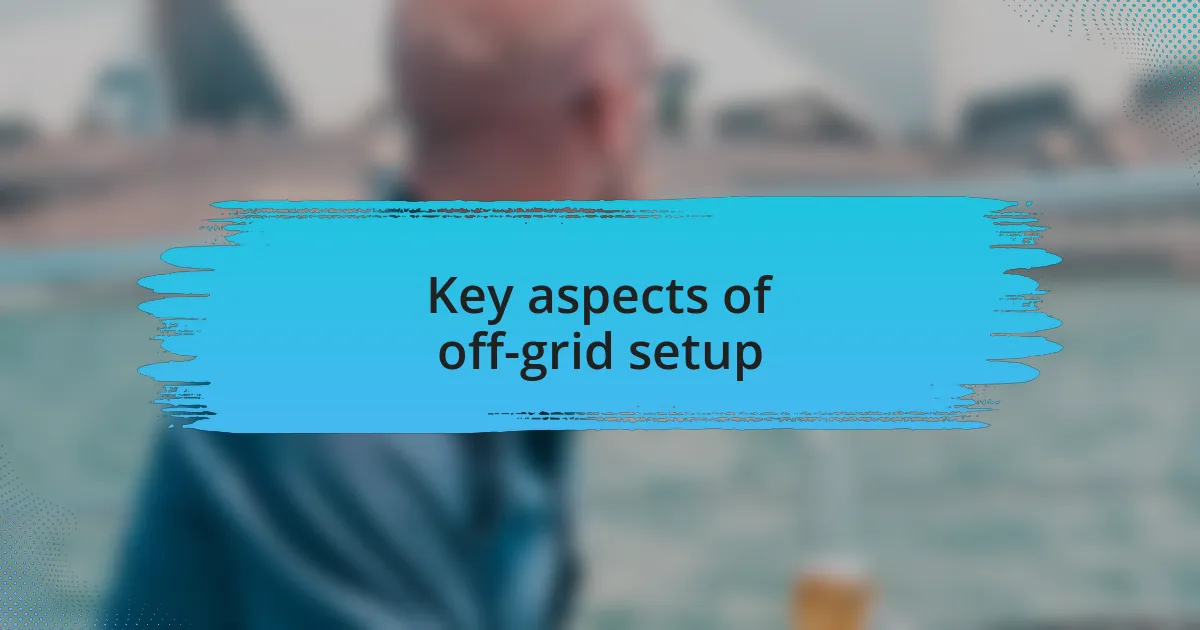
Key aspects of off-grid setup
When setting up an off-grid lifestyle, an essential aspect is securing a reliable energy source. I remember the excitement of installing solar panels on my cabin’s roof for the first time; watching the sunlight transform into usable energy felt like harnessing nature’s own gift. Isn’t it incredible how technology can bridge the gap between modern living and the beauty of the natural world?
Water sustainability is another critical element. I learned this firsthand during a particularly dry spell, when my rainwater catchment system became a lifeline. The moment I filled my storage tank, I felt an overwhelming sense of independence—like I was truly in control of my resources. Wouldn’t it feel liberating to know you can thrive on your own terms?
Lastly, effective waste management shouldn’t be overlooked. I initially struggled with composting but discovered that it not only reduces waste but enriches the soil, closing the loop in a fulfilling way. Have you ever witnessed nature’s recycling process in action? It’s eye-opening to realize that everything has a purpose, leading me to appreciate the interconnectedness of life in an off-grid setting.
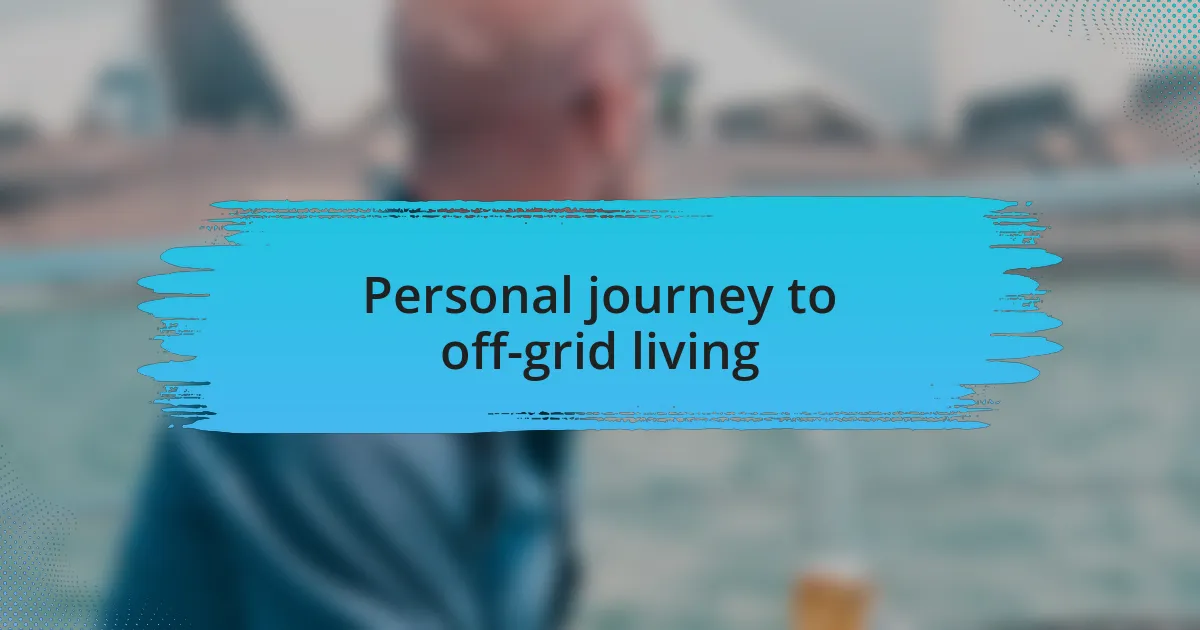
Personal journey to off-grid living
As I embarked on my journey to off-grid living, I was driven by a yearning for serenity and self-reliance. One chilly evening, while navigating the local wilderness, I stumbled upon a secluded clearing that instantly felt like home. The stillness enveloped me, and I knew then that I wanted to create a life built around nature, far from the constant hustle of city life. Have you ever felt that deep pull towards a simpler existence?
Transitioning to this new lifestyle wasn’t without its challenges. I recall one morning when I woke up to a harsh winter frost, realizing just how unprepared I was for the realities of off-grid living. I felt a mix of dread and determination, pushing me to innovate. It was in those moments of struggle that I discovered my resilience. Isn’t it fascinating how adversity can spark growth and creativity?
Learning to live with nature rather than against it became my guiding principle. I remember an afternoon spent planting a small vegetable garden, where each seed represented hope and sustainability. As I watched those seedlings push through the soil, I felt an indescribable joy; it was a reminder of the power of nurturing life. Have you ever experienced that rush of fulfillment that comes from cultivating something meaningful?
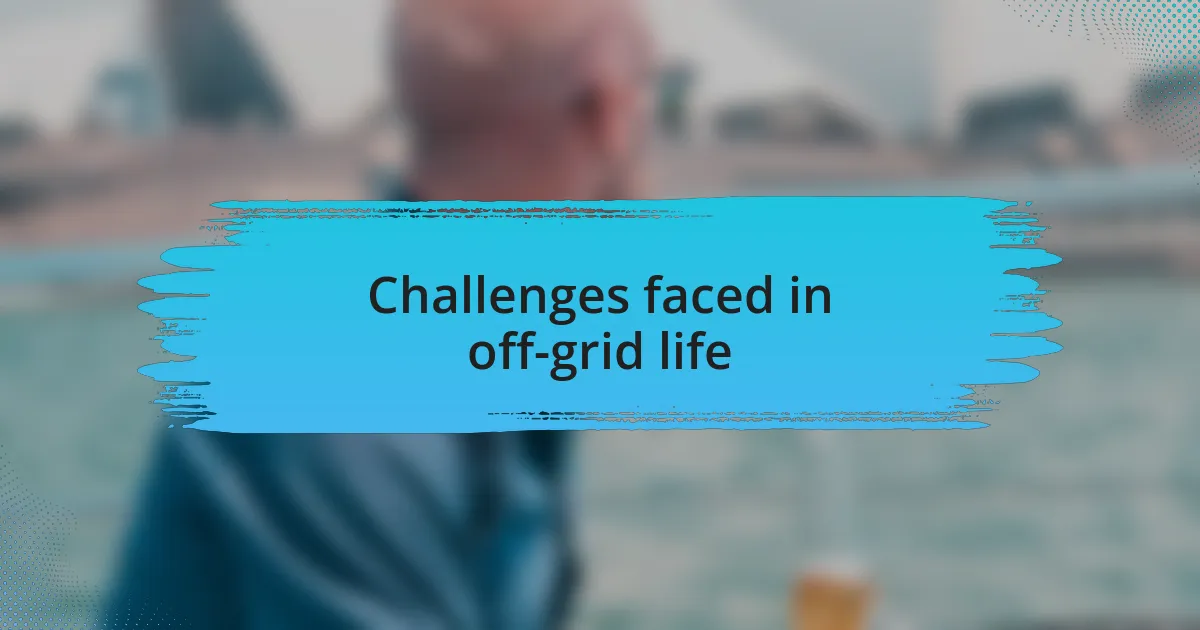
Challenges faced in off-grid life
A significant challenge I faced was the unpredictability of resource availability. There were weeks when the sun didn’t shine enough to fully charge my solar panels, leaving me scrabbling for alternative power solutions. I remember one particularly gloomy week where I had to adjust my daily routines to conserve energy, swearing I could almost hear the playful mocking of my flashlight as it flickered ominously.
Water conservation was another hurdle that truly tested my adaptability. In the beginning, I underestimated how critical it was to manage every drop. I distinctly recall a day when I was blissfully washing dishes, only to realize too late that my water storage tank was nearing empty. The panic set in, prompting a scramble to find creative ways to recycle water. Have you ever felt that gnawing anxiety when resources dwindle, and you must think on your feet?
The isolation can weigh heavily at times, especially during the turbulent winter months. I vividly remember a blustery night when the wind howled like some restless spirit, and I found myself longing for the companionship of friends and the laughter that filled my previous life. In those moments, I learned the importance of building a community, even in the most remote settings. Doesn’t it make you appreciate the connections we have, especially when solitude tries to creep in?
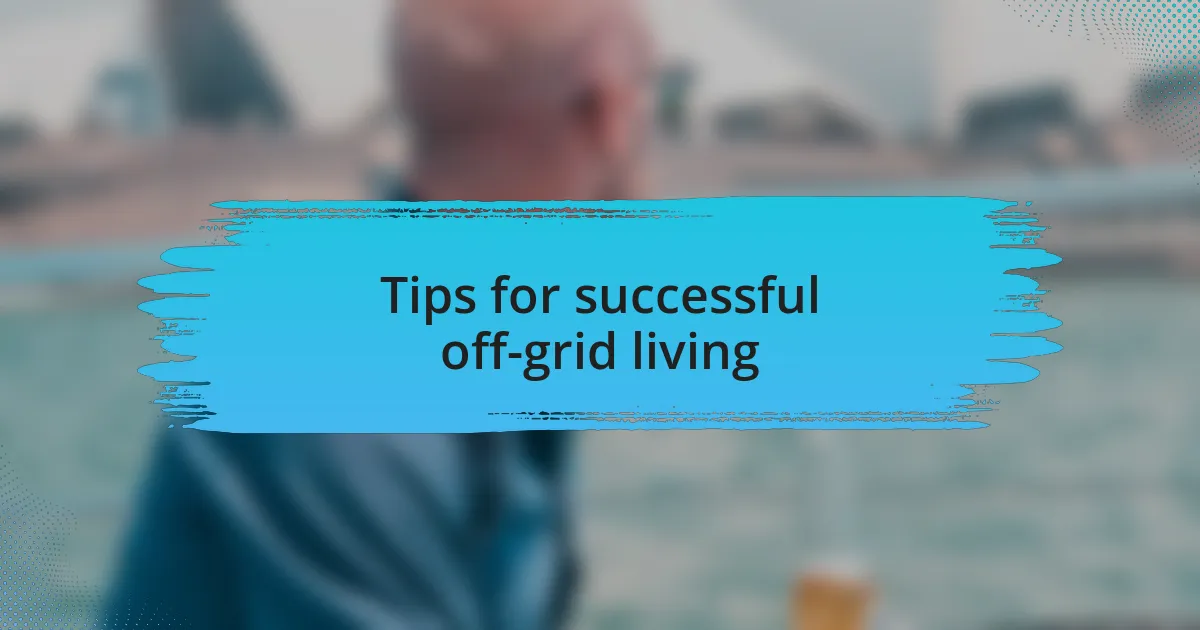
Tips for successful off-grid living
When it comes to successful off-grid living, the first tip I’d offer is to embrace a mindset of flexibility. I remember a day when my carefully planned garden layout had to shift because of unexpected weather changes. It dawned on me that adapting to nature’s whims was part of the experience, and now I find joy in the spontaneity of my surroundings. How often do we stick rigidly to our plans, only to miss the beauty of adjusting to life as it unfolds?
Resourcefulness is another vital trait for thriving in an off-grid setting. Early on, I learned the art of repurposing. A somber old wooden crate transformed into a rustic shelving unit, and I found myself creatively reusing materials that would’ve otherwise ended up as waste. It made me realize how resourcefulness not only saves money but also ignites a sense of accomplishment. Have you ever experienced that satisfaction that comes from turning something old into something valuable?
Building a reliable support network is essential too. I recall reaching out to fellow off-grid dwellers in my area, and those connections became lifelines during trying times. Whether it was sharing tools or exchanging knowledge about solar energy optimization, having people to turn to made all the difference. I often wonder, how many of us would thrive in isolation when the power of community is just a call or a knock away?